Martinrea Honsel Germany GmbH in Meschede is known as a specialist for outstanding mechanical properties, surface qualities and narrow tolerances in aluminum processing. Seeking to satisfy the rising requirements of the industry, the company replaced its outdated cut-to-length line in late 2017 and commissioned Burghardt + Schmidt GmbH with the production of a tailor-made line with a Schnutz leveler. The new system satisfies the requirements defined by Martinrea Honsel regarding evenness, operating speed and surface critical processing. It guarantees leveling quality according to DIN EN 485-4 and evenness according to DIN EN ISO 9445. Moreover, the new cut-to-length system ensures 97 percent availability.
“The range of products manufactured at our plant extends from coils and sheets to stamped blanks for trim parts in the automotive industry or sheet formed parts to decorate automobile interiors, to name just a few,” says Dipl.-Ing. Thomas Rünker, project manager at Martinrea Honsel Germany GmbH. “The maintenance requirements for our previous system were rising continuously, and the procurement of spare parts was becoming increasingly difficult by the day.” It had become necessary to maintain the old system in painstaking, increasingly short intervals in order to continue ensuring high quality – and in emergencies it was even necessary to commission external providers with cut-to-length services. System availability was therefore no longer guaranteed.
“We had already collaborated with Burghardt + Schmidt GmbH in recent years on several projects which demonstrated their technical competency,” says Rünker. “Another decisive aspect for placing the order was the expertise at Schnutz GmbH, as their levelers had been picked as core components of the new cut-to-length system.” The Siegerland-based leveler machine specialist has supplied roll levelers since the early 20th century and are therefore among the world’s oldest manufacturers in this field. In fact, Schnutz has built its first leveler in 1882. This experience was crucial to the production of a tailor-made system by Burghardt + Schmidt and its subsidiary Schnutz according to strict specifications.
Cold-rolled, wrought aluminum alloys are cut to length in the Martinrea Honsel plant in Meschede. These anodised and non-anodised aluminum strips are destined for the automotive, furniture and suitcase industries. A key requirement was the production of particularly even aluminum strips that guarantee trouble-free downstream processing. An unwinder is used to remove the strips from the coil and feed them into a leveler that uses 23 leveling rolls to ensure absolute evenness. Martinrea Honsel requires a working width of 300–1,250 mm, as well as a cut length of 300–3,500 mm. The strip thickness was between 0.3 and 2.2 mm. Moreover, the cut-to-length line needed to meet the length and form tolerances according to DIN EN 485 for aluminum and aluminum alloy strips, sheets and plates. The cut-to-length line is designed for up to 40 cuts per minute. “We manufacture those lines as a tailor-made solution in order to meet the conditions and specifications on site,” explains Thomas Baral, managing director at Burghardt + Schmidt GmbH. “The system only needs slight technical modifications to handle steel and stainless steel, as well as other metals.” Burghardt + Schmidt designs each system individually to meet the customer’s expectations and hence accommodates a broad application spectrum while still enhancing the quality of the results.
“It’s our experience that the leveling unit defines the quality of each individual system,” says Rünker. “Good, reliable and regular maintenance of the leveling cassettes is essential to satisfy our requirements, as it is the only dependable way to avoid downtime.” The leveling tools need to be reworked from time to time, and the Burghardt + Schmidt GmbH subsidiary Schnutz can handle this task as an after-sale service at its own factory in Siegen. Continuous quality and extremely short delivery times are guaranteed if the leveling cassettes need to be completely replaced.
Schnutz developed quick-change leveling cassettes so that inspection and replacement of the leveling cassettes can speeded-up. “These leveling cassettes improve accessibility and therefore the maintenance can be reduced,” says Baral. “During maintenance, the operator removes the cassette completely from the leveler and positions it on a rack which is enclosed on a robust welded steel frame. Lifting gear is then used to simply pick up the cassettes from there, inspect them, and then rework them if necessary.” This leads to minimal downtime and improved machine availability.
Once it has been unwound and leveled, the strip is then cut crosswise into metal plates. “We equipped the system with a drum shear to speed up the operating process,” reports Baral. “Its advantage is that the material runs continuously and therefore a looping pit is not needed.” Not only does this make the system more compact, but it also reduces the cost of the footings. Setting the blade clearance for the drum shear is fully automatic. This means that the clearance between the two blades is adjusted automatically depending on the material strength and thickness. Material data are entered at the main operating console, and the drum shear adjusts to the right clearance. This prevents unnecessary user errors while also speeding up the operating process.
“The benefits of quick and individual adjustment for varying material properties are perfectly obvious,” Rünker explains. “It cuts tooling times and the cost of auxiliary process times, while also allowing quick intervention during production in case of any deviation from the customary quality standard. Corrections can be initiated immediately. It also significantly extends the life cycle of the cutting tools.” Additionally, the modern electronics in the drum shear and B+S’s proprietary software guarantee the narrow length tolerances requested by Martinrea Honsel.
Once cut, the metal plates need to be stacked to ensure smooth downstream processing. But this can damage the surfaces if the plates are deposited improperly. “Our workpieces need to satisfy strict decorative standards, so an impeccable surface is essential,” explains Rünker. “This means they must not be scratched during stacking, and the edges have to be absolutely flush.”
This prompted Burghardt + Schmidt to equip the system with a swing arm machine to stack the sheets up to a height of 750 mm including pallet, without damaging their surfaces. The stacker has special swing arms with powered transport rollers in order to transport the sheets. Highly dynamic, three-phase servomotors with controlled force-velocity curve are used for the swivel and deposit movements. This ensures extremely precise swing movements. “In earlier iterations, these movements were powered pneumatically, but air is an extremely expensive medium,” says Baral to explain the motorization. “That’s why we now use energy-efficient servomotors.”
Each of the system’s manufacturing stages was completed on schedule, so Burghardt + Schmidt GmbH was able to deliver a turnkey cut-to-length system with protective fencing to Meschede as early as November. The system will be in the start-up phase until January. “Although we rescheduled the delivery date, Burghardt + Schmidt still helped us by ensuring punctual delivery and in doing so enabled quick replacement of the systems in our rolling mill,” says Rünker, looking back. “We are therefore confident that our customers will benefit from the improved quality of our new machine from January onward.”
For further information, visit: www.schnutz.com, www.b-s-germany.de, www.martinrea-honsel.com.
Fritz Honsel founded Martinrea Honsel Germany GmbH in 1908 as “Fritz-Honsel-Gravieranstalt und Formenmacherei”, domiciled in Werdohl, Sauerland. Martinrea International Inc. took over the experts for aluminum processing in 2011. Martinrea Honsel has since become a leading provider of light metal products – especially to the automotive industry. The company has around 3,000 employees worldwide, working in ten plants in Germany, Spain, Brazil, Mexico and China. With a workforce of approximately 100, the Martinrea Honsel rolling mill in Meschede is specialized in the production of outstanding mechanical properties, surface qualities and the narrowest tolerances.
Burghardt + Schmidt GmbH was founded in 1945 and manufactures technologically innovative machines and systems for the cutting and leveling of metal strips. The products are custom-built to suit the needs of the customer. The company benefits from its longstanding experience in the thin strip sector and has specialized in particular in slitting lines, stretch-bend leveling lines, packaging lines, traversing winders, leveling machines, cut-to-length lines and coil processing lines. The machines and lines are developed and manufactured at the headquarters in Remchingen, earning the quality trademark “Made in Germany”.
The roots of the company Schnutz GmbH reach back to 1846, when Martin Schnutz founded a smithy to focus on the design and construction of sheet metal processing systems in the burgeoning metalworking industry of the Siegerland region at the cusp of the 20th century. Schnutz built its first leveling machines in 1882 and proceeded to improve and expand the technology in the following years. The Schnutz multi-drive with several motors and an upgrade to the electro-motor support systems are among the most recent innovations. The company has belonged to the Burghardt + Schmidt Group since 2014.
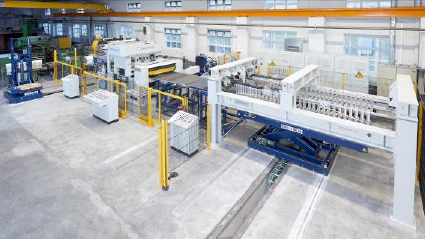
Martinrea Honsel required a new cut-to-length line with a working width of 300–1,250 mm, as well as a cut length of 300–3,500 mm. The required strip thickness was 0.3–2.2 mm, with a maximum stacking height of 750 mm. Moreover, the cut-to-length line needed to satisfy the tolerances for aluminum and aluminum alloy strips, sheets and plates defined in DIN EN 485.
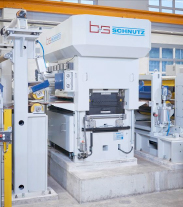
Schnutz fitted quick-change leveling cassettes to speed up inspection and replacement of the leveling cassettes. This shortened downtime and ensured improved machine availability.
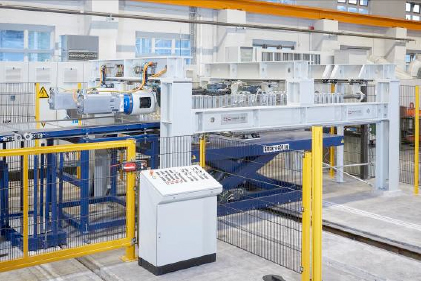
Burghardt + Schmidt equipped the system with an integrated swing arm stacking machine to protect the surface of the sheets. It has special swing arms that are powered by highly dynamic three-phase servomotors with controlled force-velocity curve.
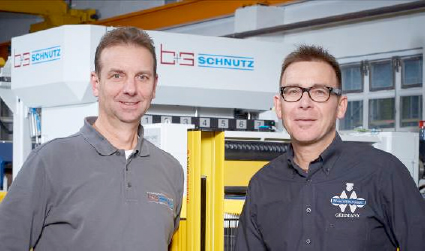
“It’s our experience that the leveling unit defines the quality of each individual system. Good, reliable and regular maintenance of the leveling cassettes is essential to satisfy our requirements, as it is the only dependable way to avoid downtime,” explains Dipl.-Ing. Thomas Rünker (on the right), project manager at Martinrea Honsel Germany GmbH. (On the left is Alexander Niessen, technical director at Schnutz.)
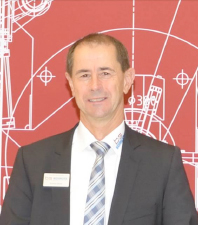
“We equipped the system with a drum shear to speed up the operating process,” reports Thomas Baral, managing director at Burghardt + Schmidt GmbH. “Its advantage is that the material runs continuously and therefore without a looping pit.”
Scott Ellyson, CEO of East West Manufacturing, brings decades of global manufacturing and supply chain leadership to the conversation. In this episode, he shares practical insights on scaling operations, navigating complexity, and building resilient manufacturing networks in an increasingly connected world.